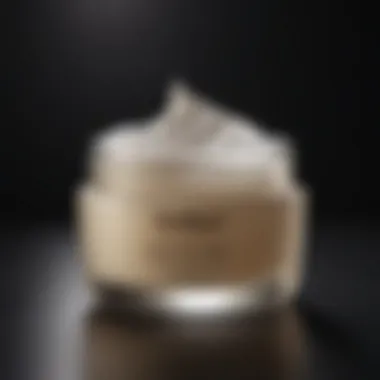Top Dermatologist-Approved Night Creams for All Skin Types


Intro
Caring for your skin is imperative, especially as you prepare for rest at night. Many dermatologists emphasize the importance of a diligent nighttime skincare routine. The skin undergoes its natural repair process while you sleep, therefore using a night cream tailored to your specific skin type can enhance this restoration.
In the realm of skin care, not all products speak to every complexion. Distinguishing between various formulations is essential for addressing unique concerns such as dryness, oiliness, sensitivity, or aging. This article focuses on dermatologist-recommended night creams that are crafted to cater to a spectrum of skin types. The intention is to provide readers with insightful information that can assist in choosing the perfect night cream to enrich their nighttime rituals.
We will touch on key ingredients that dermatologists often recommend, discuss their benefits, and highlight some standout product options. By navigating through these components, you will gain an understanding that aids in making informed decisions.
Knowledge is power in skincare. Let us explore the nuances of night creams that help maintain and improve skin health, resulting in rejuvenated skin come morning.
Understanding Skin Types
Understanding your skin type is fundamental to selecting effective skincare products. Here are the common skin types:
- Normal Skin: A balanced complexion that is neither too oily nor too dry.
- Dry Skin: Characterized by a lack of moisture, which can result in flakiness and a tight feeling.
- Oily Skin: Excess production of sebum leads to shine and may cause breakouts.
- Combination Skin: A mix, typically oily in the T-zone and drier in other areas of the face.
- Sensitive Skin: Easily irritated, reactive to products, and prone to redness or inflammation.
Understanding your skin type allows for better product selection, ensuring it works in harmony with your skin’s unique needs.
Key Ingredients in Night Creams
Dermatologists suggest looking for specific ingredients that are known to deliver results. Some of these include:
- Hyaluronic Acid: Known for its excellent moisture-binding capabilities, ideal for all skin types.
- Retinol: A vitamin A derivative effective in reducing wrinkles and improving skin texture.
- Niacinamide: This ingredient helps even skin tone and diminish enlarged pores.
- Peptides: Amino acids that stimulate collagen production, enhancing skin elasticity.
- Ceramides: Essential for maintaining the skin barrier, preventing moisture loss.
With these ingredients, choose products basing on your skin’s primary needs.
"Night creams should be rich and nourishing, aligning with your skin type to promote cellular regeneration during sleep." — Acknowledged Dermatologist
End
Selecting the right night cream requires a blend of understanding your skin's needs and recognizing the benefits of key ingredients. By committing to a nightly skincare routine that includes a dermatologist-recommended night cream, you can greatly enhance your skin's health and appearance. In the next sections, we dive deeper into specific product recommendations tailored to each skin type.
Understanding Night Creams
Night creams serve a crucial role in the overall skincare regimen. Understanding their functions and importance helps in selecting the most suitable products for individual skin types. They are specially formulated to work in conjunction with the body’s natural overnight repair processes. This distinguishes them from regular moisturizers, which can be insufficient for the skin's night-time needs.
An effective night cream addresses specific skin concerns while also being rich enough to provide deep hydration. Through this understanding, consumers can make informed decisions, paving the way for enhanced skin health.
Definition and Purpose
Night creams are thicker creams designed to support skin repair during the night. Unlike daytime products, night creams are rich in active ingredients aimed at rejuvenation. This often includes components like retinol or peptides, known for their regenerative properties.
The primary purpose of night creams is to restore moisture lost throughout the day. They should create a barrier against environmental aggressors and prevent transepidermal water loss. This hydration is key to maintain elasticity and softness in the skin, thus achieving a youthfully radiant appearance.
The Role of Nighttime Skincare
Nighttime skincare is more than just applying products before sleep; it is a pivotal routine that allows the skin to recover. During sleep, the skin engages in reparative processes. It regenerates cells and produces collagen, making nighttime an ideal opportunity to use concentrated treatments.
Utilizing a night cream can enhance this process significantly. Ingredients included in these creams often target issues such as wrinkles, dullness, and uneven texture. The longer duration of application allows these active ingredients to penetrate deeply and deliver optimal results.
Incorporating night creams into a skincare routine can provide significant long-term benefits. Consistent use not only improves skin health but may also prevent premature aging and other skin concerns.
"Night is the time when skin begins its regeneration process. Providing the right support can enhance these natural efforts."


Importance of Dermatologist Recommendations
When navigating the labyrinth of skincare products, the significance of dermatologist recommendations cannot be overstated. Dermatologists are trained medical professionals who specialize in skin health. Their expertise allows them to analyze individual skin types and concerns, leading to tailored suggestions that address specific issues effectively. Consulting a dermatologist helps to cut through the noise of marketing claims, providing consumers with reliable guidance grounded in scientific knowledge.
Some key benefits of seeking dermatologist advice include:
- Personalized Solutions: Each person's skin is unique. What works for one individual may not work for another. Dermatologists assess skin conditions and recommend products that suit personal needs.
- Protect Against Harmful Ingredients: Some over-the-counter creams may contain irritants or allergens. Dermatologists identify potentially harmful components in products, ensuring recommendations are safe for your skin type.
- Scientific Rigor: Dermatologists base their recommendations on clinical studies and proven results. This scientific backing lends credibility to the guidance they provide.
- Continuous Education: Dermatologists keep abreast of the latest advancements in skincare technologies and ingredients. Their recommendations reflect current trends supported by research, rather than outdated practices.
The recommendations from dermatologists provide a roadmap to follow, especially in a world where misinformation is prevalent. Grasping why these experts are vital to your skincare routine can empower you in your quest for healthier skin.
Why Consult a Dermatologist?
The question of whether to see a dermatologist often arises, especially among those committed to optimal skincare. Consulting a dermatologist offers valuable insights beyond what typical beauty counters provide. A dermatological visit can unravel underlying skin issues that may not be apparent.
Potential reasons to consult a dermatologist include:
- Persistent Skin Issues: Conditions like acne, rosacea, or eczema may require specialized treatment.
- Changes in Skin Appearance: Noticing new moles or changes in existing skin lesions should prompt a professional evaluation.
- Tailored Product Recommendations: Dermatologists can recommend night creams suited specifically for your skin type, allowing for a targeted approach to skincare.
Given their training and experience, dermatologists guide individuals toward products that work efficiently and safely. Finding suitable skincare can seem overwhelming, but dermatologists serve as a crucial resource.
Scientific Backing of Recommendations
The importance of scientific backing in skincare is paramount. Dermatologists rely on empirical evidence and clinical trials to base their recommendations. This reliance ensures that the products suggested are not only effective but also supported by rigorous testing.
The following points highlight why a science-backed approach to night creams is critical:
- Ingredient Efficacy: Certain ingredients, like retinol and hyaluronic acid, have undergone extensive research demonstrating their effectiveness. Dermatologists understand which ingredients work in synergy for various skin concerns.
- Safety Profiles: Dermatologists are well-informed about the safety of different ingredients and formulas. Their recommendations often favor well-studied products less likely to cause adverse reactions.
- Results-Oriented: Recommendations from dermatologists tend to focus on achieving tangible outcomes, based on evidence from clinical studies.
For those seeking to enhance their skincare routine, dermatologists offer guidance grounded in a wealth of knowledge. Trusting their recommendations can lead to a more effective and informed approach to skincare.
Key Ingredients to Look For
When selecting a night cream, the specific ingredients play a critical role. Understanding these components not only helps to address individual skin concerns but also enhances the overall efficacy of the product. Each key ingredient brings unique benefits to the table. Knowing how these ingredients work allows for more informed choices that align with skin type and goals.
Retinol
Retinol is widely recognized for its powerful anti-aging properties. As a derivative of vitamin A, retinol can promote cell turnover and stimulate collagen production. This is essential for minimizing fine lines and improving skin texture. Regular use can lead to brighter skin and a more youthful appearance. It's worth noting that some may experience initial irritation or redness, so starting with a lower concentration is advisable.
Hyaluronic Acid
Hyaluronic acid is praised for its hydrating abilities. This molecule can hold up to 1,000 times its weight in water, making it a superb choice for those with not enough moisture. It helps plump the skin and reduces the appearance of fine lines caused by dehydration. Incorporating hyaluronic acid into a night cream ensures that the skin remains well-hydrated overnight, leading to a more radiant complexion upon waking.
Peptides
Peptides are short chains of amino acids that serve as building blocks for proteins in the skin. They play an instrumental role in signaling the skin to produce more collagen and elastin, both crucial for maintaining skin's firmness and elasticity. As skin ages, the natural levels of these proteins decline. Therefore, creams enriched with peptides can effectively support skin renewal and visibly improve firmness.
Antioxidants
Antioxidants are vital for protecting the skin from free radicals, which can cause premature aging and other skin issues. Common antioxidants found in night creams include vitamins C and E, green tea extract, and resveratrol. These ingredients combat oxidative stress caused by environmental factors such as pollution and UV exposure. Using creams rich in antioxidants at night can aid in repairing skin damage and enhancing overall skin tone.
"Choosing night creams with these key ingredients can significantly improve your skincare routine and outcomes."
Understanding these essential components equips consumers with the knowledge to select products tailored to their skin’s needs. This foundational knowledge lays the groundwork for healthier skin and effective nighttime routines.
Choosing the Right Night Cream by Skin Type


Selecting the appropriate night cream is crucial for effective skincare. Each skin type has its unique needs, and using the wrong product can hinder one's skincare goals. For instance, oily skin may require lightweight, non-comedogenic formulations that do not exacerbate oiliness. Conversely, dry skin demands richer creams to provide ample hydration and barrier restoration. Therefore, understanding your skin type helps in choosing a product that promotes skin health, ensuring one reaps all the benefits of a night cream.
Oily Skin
Oily skin can often feel burdensome when choosing creams. The primary goal is to avoid products that can clog pores while still providing needed moisture. Dermatologists often recommend night creams containing salicylic acid or niacinamide. These ingredients help control sebum production and minimize pore appearance. Lightweight formulas, such as Neutrogena Rapid Wrinkle Repair Night Moisturizer, are often effective. It is essential to look for products that specifically indicate 'oil-free' or 'non-comedogenic' to prevent further oiliness.
Dry Skin
For individuals with dry skin, the focus shifts to intense hydration. Dry skin lacks moisture and may lead to flakiness and discomfort. Night creams enriched with hyaluronic acid and ceramides provide deep hydration and strengthen the skin barrier. Cerave Skin Renewing Night Cream is a notable mention, as it combines essential lipids with ceramides, ensuring long-lasting moisture. The ideal night cream for dry skin should have a rich texture, creating a protective layer on the skin.
Combination Skin
Combination skin presents a unique challenge since it encompasses both oily and dry areas. Individuals with combination skin require a balancing night cream. Look for formulations that hydrate without overwhelming oilier zones. Products containing peptides and antioxidants can help regulate moisture levels. Drunk Elephant Lala Retro Whipped Cream is well-regarded for its lightweight texture, which can cater to multiple skin concerns, making it a solid choice.
Sensitive Skin
Sensitive skin demands particular attention due to its proclivity for irritation. The ideal night cream should be free from fragrances and harsh chemicals to minimize the risk of allergic reactions. Ingredients like oat extract or aloe vera can soothe while providing hydration. Furthermore, products such as La Roche-Posay Hyalu B5 Pure Hyaluronic Acid Serum are designed to calm and hydrate without causing further irritation. Choosing the right night cream is vital for maintaining comfort and health in sensitive skin.
Exploring Top Dermatologist Recommended Night Creams
This section highlights the relevance of choosing night creams that dermatologists endorse. Recommended products are often grounded in rigorous research. Dermatologists have spent years studying skin types and how specific ingredients affect them. They provide insights that help consumers navigate the vast skincare market. When you choose dermatologist-recommended night creams, you ensure that your skin is receiving beneficial ingredients. Unlike trends which can be short-lived, these recommendations are based on proven efficacy.
Getting the suitable night cream can differ based on skin type, age, or concerns. Thus, the exploration of these top products becomes important. Knowing which night creams work can simplify your skincare routine. It also aids in achieving your skin goals more effectively. You may find specialized options that address particular issues, enhancing the overall effectiveness of your nightly regimen.
Cerave Skin Renewing Night Cream
Cerave Skin Renewing Night Cream is formulated to hydrate and restore the skin's natural barrier. This product contains ceramides, which are essential for maintaining skin hydration. It also includes niacinamide, known for its soothing properties. Niacinamide can improve skin texture and help with uneven skin tone. The cream provides overnight hydration without making the skin feel heavy. It absorbs efficiently, making it suitable for many skin types.
While applying, consider a small amount on the fingertips. Gently massage it into clean skin, ensuring even distribution. Women of all ages may find this night cream beneficial for sustaining moisture levels.
Neutrogena Rapid Wrinkle Repair Night Moisturizer
Neutrogena Rapid Wrinkle Repair Night Moisturizer features retinol, a standout ingredient in anti-aging skincare. This product works while you sleep, claiming visible results in a relatively short time. Retinol promotes cell turnover, leading to smoother skin and reduced fine lines. This cream has a lightweight feel, allowing for quick absorption.
For effective use, apply this product to a clean face and neck every night. It is advisable to start gradually if you are new to retinol. This product is designed for women looking for advanced anti-aging care without overwhelming their skin.
La Roche-Posay Hyalu B5 Pure Hyaluronic Acid Serum
La Roche-Posay Hyalu B5 Pure Hyaluronic Acid Serum is unique because it combines hydration with reparative qualities. Hyaluronic acid draws moisture, making it a fantastic choice for dehydrated skin. The inclusion of Vitamin B5 enhances the skin's natural recovery process, helping to restore its vitality. This serum can be used alone or layered beneath a night cream for added hydration.
To achieve the best results, use a few drops on clean skin each night, focusing on areas that feel particularly dry. This product is ideal for all ages requiring deep moisture and repair during sleep.
Drunk Elephant Lala Retro Whipped Cream
Drunk Elephant Lala Retro Whipped Cream offers a luxurious yet effective hydrating experience. The whipped texture allows for easy spreadability without feeling greasy. It includes a blend of oils and ingredients like sodium PCA, which help in attracting moisture. This formulation is perfect for anyone seeking a rich moisturizer that won't clog pores.
When using, apply generously to a cleansed face and neck at night. This cream may be suitable especially for dry or combination skin types looking for an intensive overnight treatment. Its formulation and texture cater to those who appreciate an indulgent application experience while addressing hydration.
"A well-chosen night cream can significantly contribute to overall skin health and appearance."
In summary, exploring dermatologist-recommended night creams can profoundly affect your skincare routine. Each of these products provides specific benefits tailored to skin types and concerns. Choosing the right one can lead to improved skin health and a more effective regimen.
Frequency and Application Tips


Understanding how often and when to apply night cream is crucial for maximizing the benefits of these products. Night creams play a significant role in skin health, enhancing hydration, nourishment, and recovery during sleep. These tips will help refine your nighttime skincare routine.
When to Apply Night Cream
Applying night cream should be part of your evening skincare ritual. The optimal time is shortly before bed, after cleansing and any necessary serums or treatments. This timing allows the cream to absorb well and take effect as you sleep, providing your skin with essential nourishment.
It's important to embrace a daily routine. Consistency in application enhances the effectiveness of the night cream. Missing nights may diminish results, as skin needs regular nourishment. Dermatologists regularly emphasize the need for regularly scheduled care. Therefore, try to incorporate this practice into your nightly tasks.
How to Apply Effectively
Applying night cream correctly can significantly influence its effectiveness. Follow these essential steps for optimal application:
- Cleanse Your Face: Use a gentle cleanser suitable for your skin type to remove makeup, dirt, and oils.
- Use a Toner: If it fits your routine, a toner can help prepare your skin for better absorption of the cream.
- Apply the Night Cream: Take a small amount of the cream, generally a pea-sized blob.
- Warm It Up: Rub the cream between your fingers to warm it. This can encourage better absorption.
- Gentle Application: Starting from the center of your face, apply the cream outward. Use gentle upward strokes, avoiding pulling the skin.
- Neck and Décolletage: Don’t neglect these areas; they also require attention and care.
By ensuring proper application, you enable the ingredients of the night cream to perform effectively. This can lead to improved skin texture and hydration. Remember, quality night creams work best when applied with care and regularity.
"Excellence is not a skill, it is an attitude." - Ralph Marston
These frequency and application tips are instrumental in achieving desired results. With diligent adherence to these practices, one can expect noticeable improvements in skin health over time.
Addressing Common Misconceptions
Misconceptions about night creams can deter individuals from fully engaging in their skincare routines. By addressing these misunderstandings, this article aims to empower readers with knowledge, enabling them to make informed decisions regarding their nighttime skincare. Understanding what night creams are, along with their true benefits, is essential for achieving optimal skin health.
Night Creams Are Only for Aging Skin
One prevalent misconception is that night creams are solely for individuals with aging skin. This idea stems from the marketing of many products that emphasize anti-aging benefits, leading to the belief that only mature skin requires extra moisture or specialized care. However, this perception lacks nuance. Night creams can benefit all skin types, including young and oily skin.
Night creams often contain a rich blend of ingredients designed to repair and hydrate the skin overnight. Here are several points to consider:
- Hydration for All Ages: Regardless of age, every skin type can benefit from added moisturizing properties. Young skin might need hydration to maintain balance, while mature skin may require it to combat dryness and fine lines.
- Barrier Restoration: Engaging in nighttime skincare, including using night creams, helps restore the skin's barrier function. This is crucial for anyone exposed to daily environmental stressors.
- Preventive Care: Starting a nighttime routine early on can prevent future skin issues, fostering a long-term approach to skincare.
Ultimately, the belief that night creams are necessary only for aging skin is constrained. All individuals stand to gain from incorporating a night cream tailored to their specific skin type and needs.
The End and Recommendations
Understanding the importance of selecting the right night cream is crucial for achieving optimal skin health. This article has focused on dermatologist-recommended night creams, tailored to meet diverse skin types and concerns. Recommendations are based on scientific evidence and expert opinions, ensuring that readers have reliable information to guide their choices. Choosing an appropriate night cream provides vital nourishment while you sleep, addressing specific skin issues effectively.
One must consider several key factors when making an informed choice. Skin type plays an essential role; for instance, oily skin requires lighter formulations, while dry skin benefits from more emollient options. Additionally, looking for certain active ingredients can enhance effectiveness. Ingredients such as retinol and hyaluronic acid are known for their impressive benefits. Adequately analyzing product claims, ingredient lists, and personal skin needs helps ensure the right match.
"Night creams can vary significantly in formulation and function. A careful selection can lead to improved skin texture, moisture balance, and overall radiance."
In addition, considering dermatologist recommendations adds credibility to product choices. These professionals delve into the science behind skincare and offer personalized solutions that align with individual skin concerns. A consultation with a dermatologist is worth the investment, as it provides insights tailored specifically to unique needs.
Lastly, stay informed and up-to-date with new developments in night cream formulations. The world of skincare is rapidly evolving, employing innovative ingredients and techniques that can enhance effectiveness beyond traditional products. This dynamic consideration of options will ensure a well-informed approach to skincare.
Making Informed Choices
When selecting a night cream, knowledge and awareness are fundamental to making an informed decision. Start by assessing your skin type accurately with guidance from dermatologists if needed. This step ensures you understand the specific needs of your skin. A few key considerations include:
- Understanding your skin type: Identify whether your skin is oily, dry, combination, or sensitive. This will guide your product choices.
- Reviewing ingredient lists: Focus on key ingredients that can benefit your specific skin concerns. Look for products containing hyaluronic acid for hydration or retinol for anti-aging.
- Avoiding irritants: Check for known allergens or irritants based on your skin's sensitivity. Formulations should be gentle and non-comedogenic, especially for problematic skin types.
- Trial and feedback: If possible, test samples before committing to a full-size product. Doing so allows you to gauge how your skin reacts without a significant investment.
Ultimately, informed choices promote skin health and enhance overall satisfaction with your skincare routine.
Future Trends in Night Cream Formulations
The landscape of skincare is ever-changing, and night creams are no exception. Future trends will likely focus on innovation, sustainability, and personalized formulations. A few anticipated trends include:
- Biotechnology: Advancements in biotechnology are expected to introduce ingredients that offer better absorption and potency, ensuring more effective treatments.
- Eco-friendly packaging: As awareness regarding environmental impact grows, brands are likely to adopt sustainable packaging materials. Eco-conscious consumers are pushing this trend forward.
- Customized formulations: With the rise of personalized skincare, future night creams may cater to individual skin needs and preferences, delivering tailored solutions based on specific issues.
- Multi-functional products: Consumers increasingly seek products with several benefits. Future formulations may include ingredients that target various concerns like hydration, anti-aging, and barrier repair in one cream.
By staying informed about these trends, readers can adapt their skincare routines and discover new dermatologist-recommended night creams that meet evolving standards.



